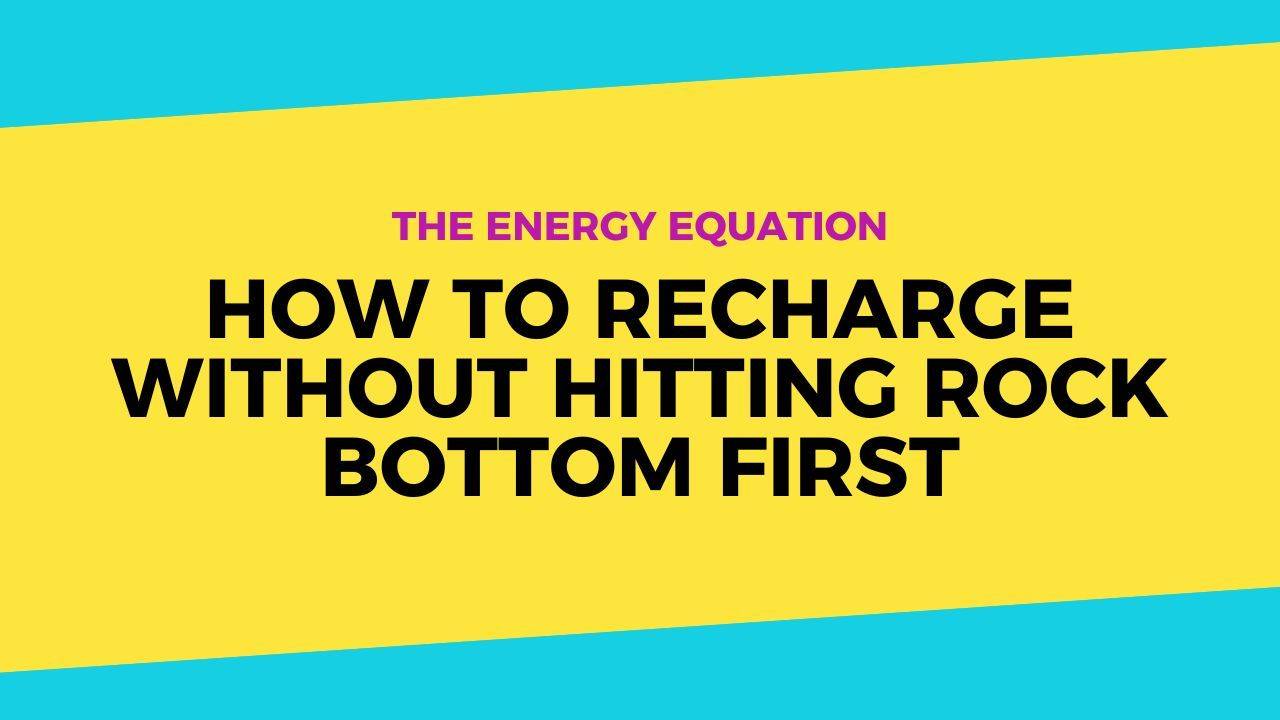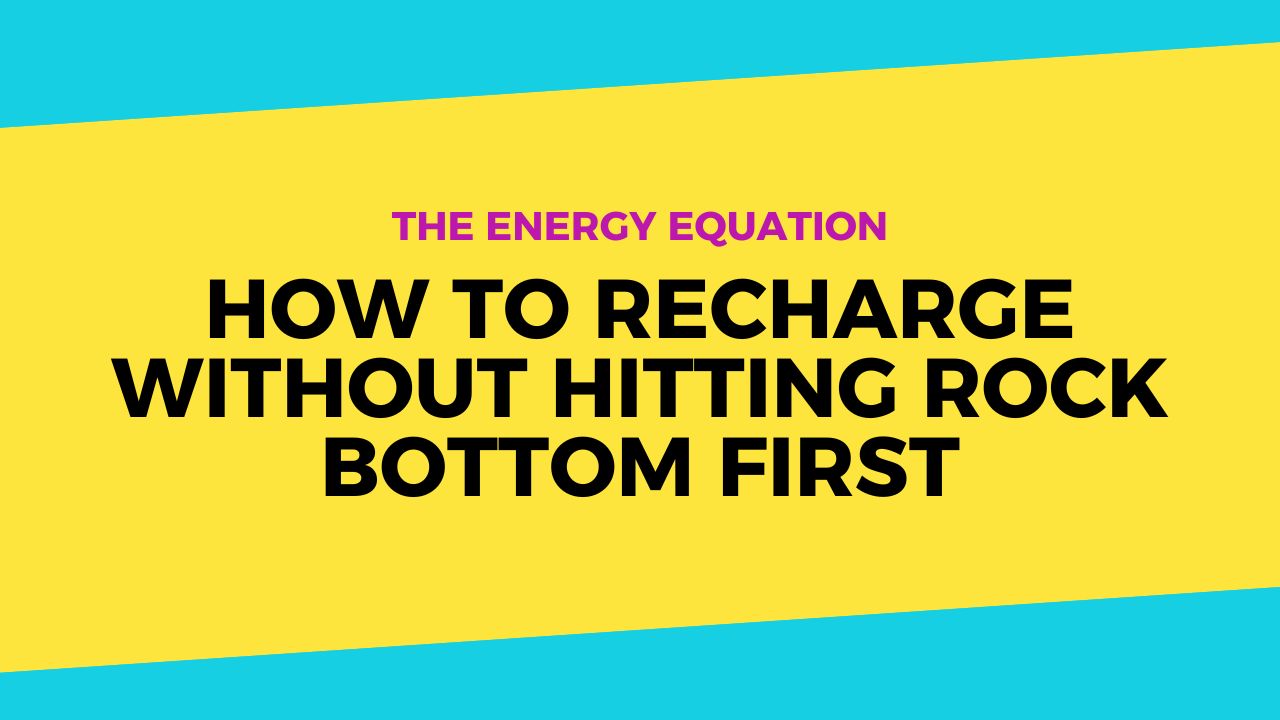
The Energy Equation—How to Recharge Without Hitting Rock Bottom First
Mar 25, 2025
You know the drill: You push through exhaustion, power through another to-do list, and tell yourself you’ll rest “when things calm down.”
Spoiler alert: They never do.
If you’ve been running on caffeine, adrenaline, and sheer willpower, hoping you’ll find time to slow down eventually, I’ve got some hard truth for you:
Energy doesn’t magically appear. It’s something you have to create and renew.
And if you’re constantly withdrawing from your energy bank without making deposits, burnout isn’t a matter of if—it’s when.
But here’s the good news: You don’t need a two-week vacation to recharge. You don’t need to “quit hustling” or “just take it easy” (because let’s be real—you won’t).
What you do need is a strategy—one that balances stress with recovery so you can show up at your highest level without constantly running on fumes.
Because here’s the thing: Energy isn’t just about sleep. It’s about how you manage the physical, mental, emotional, and spiritual fuel that keeps you going. It’s about avoiding burnout before you crash, instead of picking up the pieces once you’re already on empty.
This is where the Energy Equation comes in.
Let’s break it down:
Burnout Isn’t Just in Your Head—It’s in Your Whole Body
Burnout isn’t about being “bad at balance.” It’s not about “needing to manage stress better.”
Burnout is a biology problem.
Here’s how it works:
- Stress drains energy. Your body is designed to handle short bursts of stress (like running from a bear), but modern life keeps you in a constant state of go-go-go. That drains your reserves fast, leaving you depleted before the day is even over.
- When life demands more from you, your body needs more energy to keep up. You can’t just push through indefinitely without replenishing what you’re losing. Think of it like a bank account—if you keep withdrawing without making deposits, you’ll eventually hit zero.
- Most people increase stress without increasing recovery. More deadlines, more obligations, more responsibilities—but no extra rest, nourishment, or real downtime. In fact, there’s a tendency to cut back on workouts, sleep, and good nutrition - which are the top 3 sources of energy for your body and brain. You’re running a constant energy deficit, and your body is paying the price.
And that’s the real problem. When you keep piling on stress without replenishing your energy, burnout is inevitable. You don’t just wake up one day suddenly exhausted—it’s the result of chronic depletion over time.
Your body doesn’t care how ambitious you are. It doesn’t care how many people rely on you or how many goals you have lined up. If you don’t fuel it properly, it will force you to slow down—whether you like it or not.
So instead of waiting until you crash, let’s talk about how to keep your energy balanced before you hit rock bottom—because prevention is way easier (and faster) than recovery.
The Energy Equation: What Goes Out Must Come In
Think of your energy like a bank account.
Everything you do throughout the day either withdraws from your energy reserves or deposits into them.
Energy Out (Withdrawals):
🚨 Work deadlines
🚨 Decision-making (yes, even choosing what to eat for dinner drains energy)
🚨 Emotional labor (caring for others, managing relationships, people-pleasing)
🚨 Social obligations (especially when they feel like obligations instead of joy)
🚨 Overthinking (aka, your brain running on overdrive)
🚨 Digital overwhelm (constant notifications, endless scrolling, information overload)
Energy In (Deposits):
✅ Quality sleep (not just more sleep, but better sleep)
✅ Nourishing food (consistent meals that support energy, not just quick fixes)
✅ Movement (not just structured exercise—gentle, restorative movement counts, too)
✅ Laughter & joy (the fastest way to reset your nervous system)
✅ Deep breathing & mindfulness (a two-minute reset can shift your entire day)
✅ Social connection with the right people (aka, not energy vampires)
✅ Creative expression (doing things that light you up, not just what you have to do)
Here’s the hard truth: Most people are making withdrawals all day long without putting anything back in.
And just like with money—when you overspend without adding income, you go into debt. In this case? That debt shows up as burnout, exhaustion, and overwhelm.
The goal isn’t to eliminate stress (because, let’s be real, life isn’t going to slow down anytime soon). The goal is to balance energy out with energy in—so you’re not constantly running on fumes.
So, where do most people go wrong?
They only focus on one type of energy—when in reality, there are four you need to manage. And if you’re neglecting even one, you’re setting yourself up for burnout faster than you think.
The 4 Types of Energy You’re Probably Neglecting
Most people think energy is just about sleep and nutrition. But if you’re constantly drained despite doing everything right, here’s why:
There are four energy buckets that need to be filled—and you’re likely neglecting at least one. When one runs low, the others have to work overtime to compensate, leaving you exhausted, irritable, and struggling to keep up.
1. Physical Energy 🔋 (Your Foundation)
This is your body’s baseline fuel—sleep, hydration, movement, and nutrition. Without it, nothing else functions properly. If you’re skipping meals, dehydrated, or running on five hours of sleep, no amount of “self-care” is going to fix your exhaustion.
💡 Quick Fix: Drink a glass of water right now. (Seriously—your energy levels will thank you.) Bonus: Add protein + fiber to your next meal to stabilize blood sugar and avoid energy crashes.
2. Emotional Energy 💖 (Your Boundaries & Relationships)
Emotional exhaustion doesn’t come from doing too much—it comes from giving too much without refilling your own cup. People-pleasing, absorbing other people’s stress, and always being the "strong one" drains your energy faster than a phone on 1% battery.
💡 Quick Fix: Say “no” to something today that drains you. (Even if it’s just ignoring that guilt trip text from your coworker.) Protecting your emotional energy is a power move.
3. Mental Energy 🧠 (Your Focus & Clarity)
Your brain is like a web browser—too many tabs open, and it slows to a crawl. Decision fatigue, information overload, and the pressure to be “on” 24/7 are major energy drains.
💡 Quick Fix: Take a brain break. Step outside, close your eyes, stare at something other than a screen, or set a 2-minute timer and just breathe. Your mind works better when you give it space to rest.
4. Spiritual Energy 🔥 (Your Passion & Purpose)
Feeling disconnected from your values, purpose, or the things that light you up? That’s an energy leak. When you’re just going through the motions, your soul gets drained—even if everything looks "fine" on the outside.
💡 Quick Fix: Do one thing today that fuels your soul—journaling, prayer, a creative hobby, a deep conversation, or simply doing something because it brings you joy.
Here’s the deal: When one of these buckets is empty, it doesn’t matter how much you rest—you’ll still feel drained. That’s why real energy management is about more than just sleep. The secret isn’t just slowing down—it’s recharging in the right way.
Micro Recovery: The Secret to Sustainable Energy
You don’t need a two-week vacation to reset your energy. You need Micro Recovery.
What is it? Small, intentional energy deposits throughout the day that prevent you from running on fumes. Most people think energy recovery requires massive lifestyle changes, but in reality, tiny, strategic resets throughout your day make a huge difference in preventing burnout.
Quick Wins: Recharge in Under 5 Minutes
Physical: Stand up, stretch, drink a glass of water, or take a quick walk around the room. Even 30 seconds of movement signals your body to wake up and reset.
Emotional: Set (and enforce) a boundary—say no to something draining, mute that chatty coworker, or step away from energy-draining conversations.
Mental: Take a 5-minute “off” break—no screens, no decision-making, no information overload. Just breathe, stare out the window, or let your mind wander.
Spiritual: Do one thing that reconnects you to what actually matters—whether it’s journaling, a gratitude practice, listening to a favorite song, or stepping outside for fresh air.
The key? Make these micro recoveries a habit, not a last resort. These small shifts prevent depletion mode—so you don’t have to “recover” from burnout because you never get there in the first place. Instead of waiting until exhaustion forces you to slow down, build energy-boosting moments into your day before you crash.
The Real Cost of Waiting Until You Crash
Here’s the harsh truth: The longer you run on fumes, the harder it is to recover.
Burnout isn’t something you can just “push through” forever. If you keep draining your energy without replenishing it, eventually, your body will force you to stop—whether you like it or not. And the consequences? They don’t just hit you; they ripple into every part of your life.
🚨 Your productivity tanks—you make more mistakes, take longer to complete tasks, and struggle to focus.
🚨 Your health declines—weakened immune system, brain fog, chronic fatigue, and even hormonal imbalances.
🚨 Your relationships suffer—you become more irritable, emotionally detached, or too exhausted to be present for the people who matter.
And here’s the worst part: By the time you hit full burnout, recovery takes exponentially longer. It’s like waiting until you’re bankrupt to start budgeting. The deeper the hole, the harder it is to climb out.
So don’t wait. Start now. Even small steps—five minutes of rest, a glass of water, saying no to something draining—can change your trajectory before you hit the wall. Energy is a resource. Manage it wisely.
Recharge Like You Mean It
Energy isn’t something you “find.”
It’s something you create.
Every action you take either builds your energy or drains it—so start paying attention. What fuels you? What leaves you feeling depleted? The more intentional you are about protecting your energy, the more unstoppable you become.
🔥 Boundaries? Not optional.
🔥 Rest? A strategy, not a luxury.
🔥 Recovery? Non-negotiable.
And if you’re ready to stop running on fumes, start managing your energy like the high-achiever you are, and do it with a squad that won’t let you burn out…
Join Soul on Fire. Because success shouldn’t come at the cost of your energy, and thriving shouldn’t feel like an afterthought.
Ready to build sustainable energy and resilience? Let’s go. Join Soul on Fire Today.
10 Micro Strategies to Boost Your Energy & Resilience
Instead of reaching for that candy bar or cup of coffee, here are 10 QUICK & EASY WAYS you can increase your energy and resilience by changing your chemistry and physiology.
Just let me know where you want me to send them.
We hate SPAM. We will never sell your information, for any reason.

